
Pilot programme to measure coronavirus prevalence in waste water treatment plants
Rhaglen beilot i fesur lefelau coronafeirws mewn gwaith trin dŵr gwastraff
A pilot programme which will flag early signs of the coronavirus in Welsh communities by monitoring sewage systems, has been awarded almost half a million pounds - the Health Minister Vaughan Gething has confirmed.
The frequent monitoring of coronavirus levels at waste water treatment plants can offer a signal of the infection rate in the community and provide early sign that coronavirus is present.
The World Health Organization is clear there is currently no evidence that coronavirus has been transmitted via sewerage systems.
The Welsh Government has awarded the funding to a consortium led by Bangor University, working with Cardiff University, Public Health Wales and Dwr Cymru Welsh Water.
They will develop a monitoring programme that can measure the presence of the SARS-CoV-2 virus in wastewater. The presence of SARS-CoV-2 in human waste is common in almost all confirmed Coronavirus cases.
The pilot programme will be funded for an initial six months, sampling will begin almost immediately in a small number of water treatment plants, rapidly expanding to up to 20 treatment plants that cover approximately 75% of the Welsh population.
Whilst monitoring for Coronavirus the systems established will also be able to determine whether other types of respiratory viruses are also present, which will help public health monitoring.
The Minister for Health and Social Services, Vaughan Gething, said: “To halt the spread of the coronavirus we need to measure it within our communities and monitor changes. This pilot programme will allow us to develop an early warning system to provide signals on the levels of coronavirus infections in the community. This will complement our wider public health programmes, including testing.
“The funding provides the opportunity to build upon existing strengths and partnerships that we have in Wales in environmental sciences, disease surveillance and pathogen genomics. I’m pleased to be working with partners from across Wales.”
Professor Iwan Davies, Bangor University Vice-Chancellor commented:
“I’m delighted that the ground-breaking environmental monitoring work, which combines different areas of expertise at our College of Environmental Science & Engineering, is to contribute to the nation’s vital work to protect communities against Covid-19 and further outbreaks of coronavirus and other infectious viruses.”
Steve Wilson, Welsh Water’s Managing Director of Wastewater services, said: “We are very pleased to be part of this pilot programme which will play such a crucial role in helping to identify the presence of coronavirus in an area in future. This will build on the successful partnership we already have with Bangor University on the research they undertook into the presence of traces of the virus in wastewater. This will also build on the strong working relationship we already have with Cardiff University.”
Professor Andrew Weightman, Head of the Organisms and Environment Division at Cardiff University’s School of Biosciences, said: “Knowledge of how this virus is spreading in the community is a vital part of preventing the spread, particularly as lockdown measures are eased. Wastewater monitoring of Sars-CoV-2 provides an alternative approach. It’s a simple way for us to determine the level of infection in a large community.
“Research suggests people start to shed the virus in faeces up to about two weeks before they get symptoms so this approach can also be used as an early warning system to indicate when levels of the virus are rising in the community. This will help us predict the potential re-emergence of Covid-19 outbreaks - and ultimately help us protect communities across Wales.”
